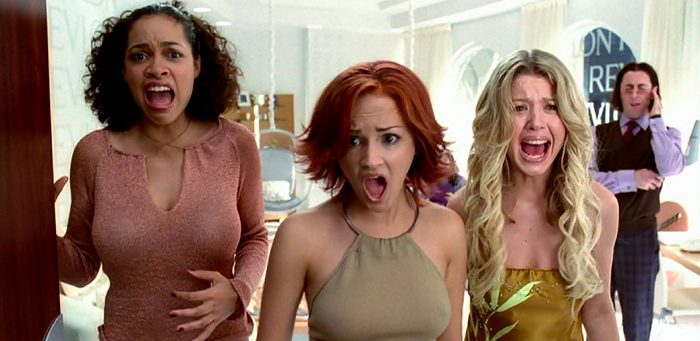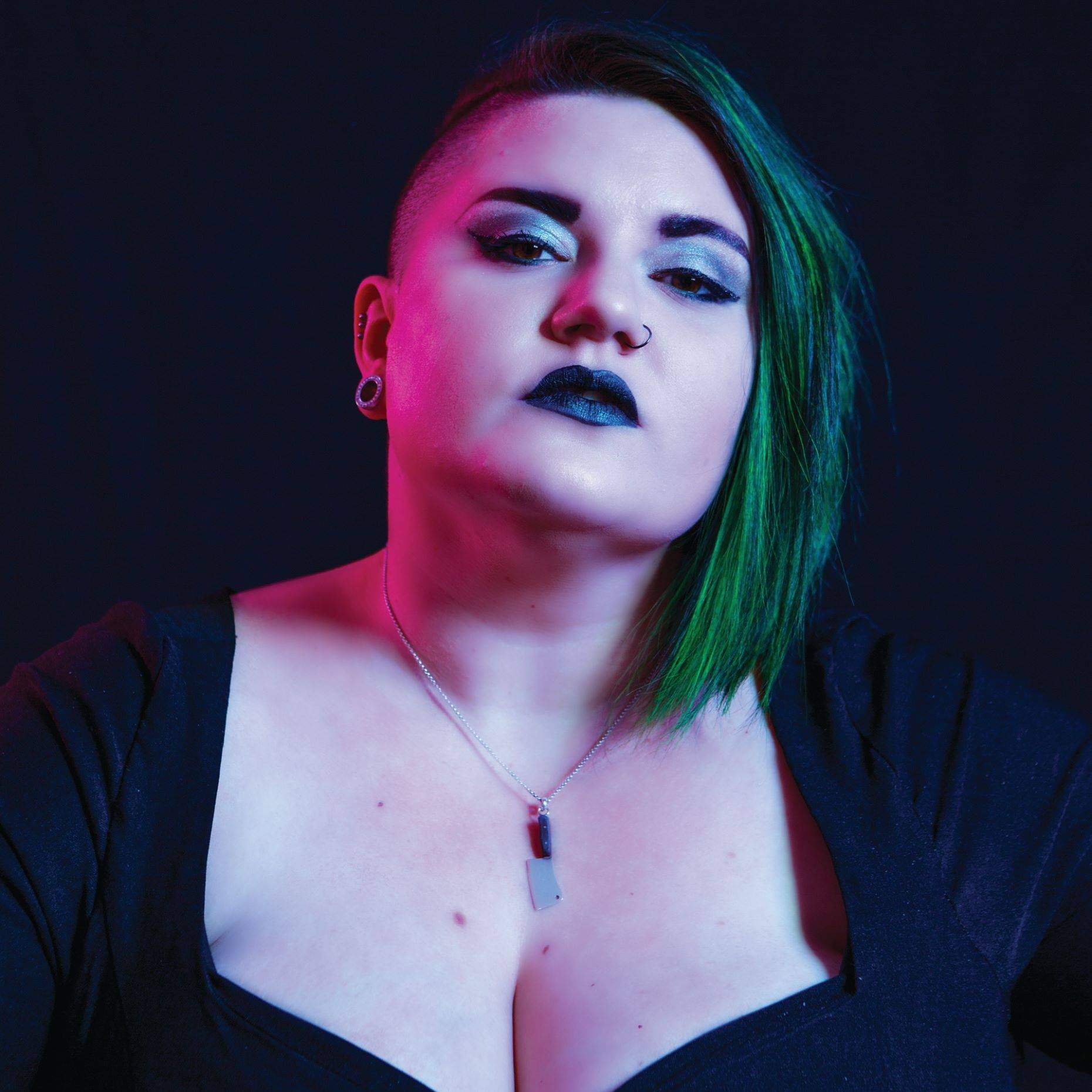‘Josie and the Pussycats’ predicted the influencer culture we're living in 20 years ago
We should have listened.

“But kids today aren't dumb. They're not gonna buy just anything. That's why the government has been planting small subliminal advertising suggestions in today's rock music. The results? We can now get these kids to buy just about anything. We can have them chasing a new trend every week. And that is good for the economy. And what's good for the economy... is good for the country.” - Eugene Levy, Josie and the Pussycats
Twenty years after Josie and the Pussycats bombed at the box office and was torn to shreds by (predominantly white male) critics, the sweet sound of vindication floats through the air in the form of audiences rediscovering Rachael Leigh Cook lip-synching the iconic sounds of Kay Hanley of ‘Letters to Cleo.’ A perfect time capsule of early-aughts culture, the frosted lip gloss, heavily sequined, and body glitter covered Josie remains relevant and entertaining after all these years, because it successfully predicted the world we’re currently experiencing with uncanny accuracy.
For the uninitiated, Josie and the Pussycats is not just a satirical rock movie about the greatest band to ever play the Riverdale bowling alley rising to superstardom, it’s also a film playfully pointing out the very real dangers of corporate greed and powerful media industries manipulating the masses into conformity and capitalism. The film opens with the biggest boy band in the world, Du Jour, (played with perfection by Donald Faison, Seth Green, Breckin Meyer, and Alexander Martin) discovering a mysterious backing track on their new album, only for their manager Wyatt Frame (the incomparable Alan Cumming) to eject himself from the band’s private plane, but not before setting the plane on a guaranteed crash course. “Du Jour means seatbelts!”
As we learn, Wyatt is in cahoots with the fabulously evil Mega Records CEO, Fiona (Parker Posey, who always understands the assignment) and the U.S. Government to hide subliminal messages under popular music to brainwash the youth of America into buying and believing whatever is fed to them as “cool.” With this at the core of Josie, the world of the film is covered in logos and product name drops at every turn to a hilariously exaggerated degree. The brilliant and biting commentary on the intersection of celebrity and consumerism went unappreciated by the masses at the time of its release, but as we look back now, it’s hard not to see the message as an overly branded warning of things to come.
Melody’s McDonald’s themed bathroom, the Target themed private plane, the Revlon covered apartment movie, and even the Evian water aquarium were all meant to poke fun at our label obsessed culture. Fans may be shocked to learn that despite the wall-to-wall branding featured throughout the film, none of the intentionally placed products paid to be in the movie. That just isn’t so anymore. Now, we have films where the labels of drinks are always cheated toward the camera, bags of chips are perfectly open so as to not wrinkle the label, films like Jurassic World look like a Mercedes Benz commercial with dinosaurs, and there’s, well, Michael Bay’s entire filmography. Josie knew that this is where we were going with the future of big-budget filmmaking, and we laughed it off as an impossible concept.
Celebrity endorsements are nothing new, but the 2000s turned it into a bonafide business. There’s a great visual gag in Josie’s apartment after the band has made it big where Val (Rosario Dawson) realizes that the cans of Diet Coke have Josie’s face on them. Val’s reaction is one of shock, which for 2001, felt accurate. Seven years after the release of Josie, Diet Coke released cans featuring Sarah Jessica Parker’s face in a style almost identical to the Josie cans. As for today, Diet Coke’s endorsement deal with Taylor Swift netted her a whopping $26 million dollars. Celebrities are no longer just paid sponsors of products--they’ve become brand ambassadors, and thanks to the advent of social media, “normal people” can become brand ambassadors too.
The reality is that marketing of all types are on a base level-- a form of manipulation. Subliminal messaging is illegal in most countries, but not explicitly so in the United States. The over-the-top barrage of celebrities telling you what’s cool was meant to be a punchline, but now it’s just our reality. It feels like every other Instagram ad is another celebrity showing off a new meal delivery service, their new skincare line, or giving out coupon codes to buy things customized to their fanbases. Hell, McDonald’s restaurants ran out of burgers after designating “The Travis Scott Meal” as an option as a collaboration with the rap star. Tara Reid’s Melody impulsively stating “I want a Big Mac” just because the music told her she wanted one, despite being a vegetarian, doesn’t seem so far-fetched after all.
The latest updates, reviews and unmissable series to watch and more!
In the years before and surrounding Josie and the Pussycats, the music industry looked a lot different. As streaming continues to dominate, album sales are continuing to decline to some of the lowest numbers in history. If an artist wants to live like a rock star, they have to find other means of making their money. For a lot of them, that means endorsement deals and non-music products. Lil Nas X’s music video for “Montero (Call Me By Your Name)” stirred up enough controversy to land him as the major talking point for newsrooms across the globe, and also allowed him to sell out 666 pairs of custom ‘Satan Shoes’ for $1,018 a pop in under a minute.
The idea for Josie’s big rock concert to stream online was groundbreaking in 2001, but last April saw 12.3 million concurrent players participate in a game of Fortnite while Travis Scott played a virtual concert in the game. Downloading Fortnite to watch a concert is the Gen-Z version of buying pussycat headphones to hear a concert online (of which I own a pair worn on screen in the film thankyouverymuch).
Josie knew twenty years ago where the world was heading, and did so five years before Idocracy, the satire most point toward when comparing the absurd realities of today to the seemingly ridiculous predictions of yesteryear. Perhaps it’s because Josie and the Pussycats was a film beloved by women and the LGBTQ+ community that it went ignored in favor of Mike Judge’s far more macho counterpart, or perhaps it’s because we weren’t ready to have that sort of internal reflection in 2001. Regardless, Josie and the Pussycats set out the blueprint for an existence we’re all trying to navigate, and much like a mysterious warning written in lipstick on our bathroom mirrors, we should have listened.
Jerkin! Tretorns are the new Adidas!
BJ Colangelo is an award winning filmmaker and film analyst specializing in dismissed cinema and television. She writes about horror, wrestling, musicals, adult animation, sex and gender, kicking pancreatic cancer’s ass, and being a fat queer in places like Fangoria, Vulture, The Daily Dot, Autostraddle, Playboy.com, and a handful of books college students get assigned to read. She’s also the co-host of the teen girl movie podcast, This Ends at Prom, with her wife, Harmony.


